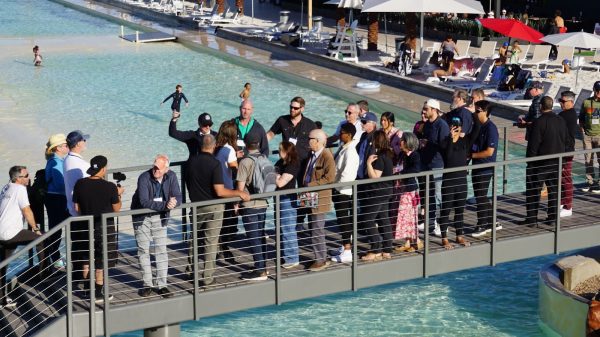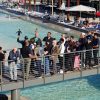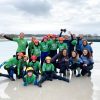OK, so we all know the answer to that question: No. Because surf pools aren’t meant to replace ocean surfing, but rather, they’re meant to supplement it. In this new piece from Red Bull’s “Just Sayin” series, two of their greatest team riders — Mick Fanning and Jamie O’Brien — discuss the pros, cons and future of artificial surfing. Fanning is more of a surfing purist — critical of surf pools — whereas O’Brien says he could “just retire and surf a wave pool for the rest of my life.” Click play above to listen to Fanning and O’Brien compare and contrast surfing in the ocean versus a pool. It’s really good stuff.
————————————————————————————————————————————————-
It’s surfing’s greatest debate: wave pool or the real thing?
Since the 1980s, professional surfing has dabbled with artificial waves – the first pro event, the Inland Surfing Championships, was held in truly lacklustre conditions in a wave pool in Allentown, Pennsylvania, USA. And throughout the 1990s and early 2000s, various entrepreneurs and investors made noise about new ‘ground-breaking’ technology that ultimately amounted to yet another uninspiring artificial wave.
Typhoon Lagoon, a 13.6m-litre (3m-gallon) wave pool located at Walt Disney World, Florida, USA, was a step in the right direction and for years it was a novelty destination for curious pros and average joe surfers alike. Various other pools popped up – from Malaysia to the United Arab Emirates to Tenerife – that offered glimpses of possibility, but still nothing that could come close to authentic ocean waves.
That all changed on December 18, 2015, when a video of a brown, perfectly barrelling, and absolutely mesmerising artificial wave unexpectedly dropped on social media. Disappearing inside tube after long tube was none other than 11-time WSL World Champion Kelly Slater.
Rumours had swirled for years about the ‘Kelly Slater Wave Company,’ but Slater and his team had remained tight-lipped the whole time, squeezing out to the press nothing more than vague statements of promise. Well, the Surf Ranch, as the wave pool was soon dubbed, delivered on its promise in spades, hosting the WSL Freshwater Pro in 2019. And the 21st Century wave pool technology rush was most certainly on.
It was at this point that the long-simmering but lukewarm debate about wave pools destroying the soul of surfing reached a boil. The arguments for and against came from surfers of all ages and abilities. In our latest episode of Just Sayin’, three-time WSL World Champion Mick Fanning explains that, for him, the ocean will always reign. “I get bored,” Fanning says of surfing in wave pools. “But it’s a great training tool.
Pipe Master Jamie O’Brien is more excited. “I could just retire and surf a wave pool for the rest of my life,” he says.In truth, when Slater revealed the Surf Ranch to the world, other promising technologies were well in the works. In Spain, Wave Garden was pumping out long, fun lines that behaved much like natural ocean waves. Wave Garden quickly opened two other locations in the United Kingdom, called Surf Snowdonia and The Wave.
Meanwhile, back in the US, Slater suddenly had stiff competition in…Texas. First, in the city of Austin, and then in the off-the-beaten-track town of Waco. The latter wave pool, called BSR, was a worthy rival to the Surf Ranch. Instead of offering long, pointbreak-esque waves like those that the Kelly Slater Wave Company had designed for Surf Ranch, BSR opted for beachbreak-style waves that offered much more variety and unpredictability. Soon, pro surfers were flocking to BSR to push the limits of aerial surfing.“There’s a whole surf community in the middle of Texas,” O’Brien says in this episode of Just Sayin’. “You would never think in your right mind to build a wave pool in Waco!”
The fact that Texas – an American state nowhere near the ocean – had become home to a sought-after wave called up memories of the 1987 cult classic film North Shore, in which a landlocked surfer named Rick Kane wins a surf contest at a fictional Arizona wave pool, earning him a free trip to the mecca of surfing, the North Shore of Oahu, Hawaii. After a winter of training in the real thing, Kane goes on to win an event at the world’s most infamous wave, the Banzai Pipeline…
For the rest of the story, click here.













You must be logged in to post a comment Login